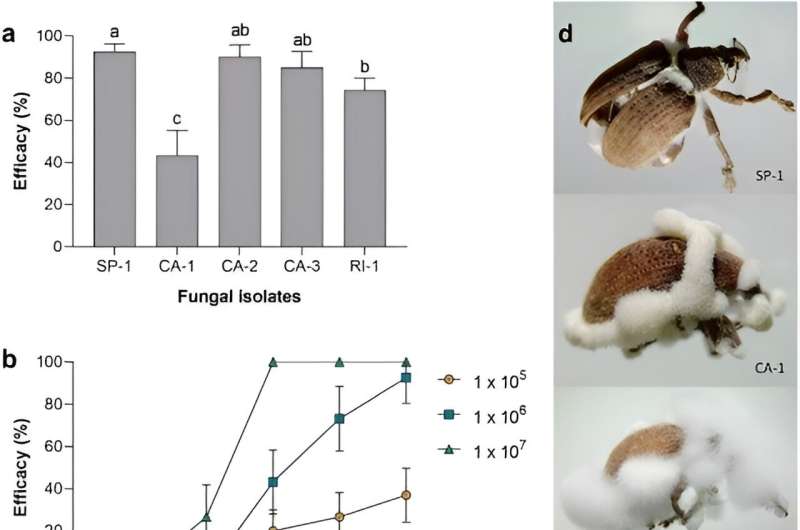Scientists develop bio-pesticide from fungi to control a beetle and protect Eucalyptus plantations

Gonipterus platensis, or the Eucalyptus snout beetle, has a heavy impact on Eucalyptus forest plantations worldwide, and are mostly controlled using the micro wasp Anaphes spp, although control rates rarely become financially viable. This led a team of scientists to look for naturally infecting pathogenic fungi to tackle the Eucalyptus snout beetle problem.
Worldwide, the Eucalyptus forest covers more than 20 million ha. In the Iberian Peninsula, the Eucalyptus snout beetle could cause defoliation levels of 100% and produce wood volume losses of up to 86%. Although Eucalyptus wood is important for paper pulp production, the Eucalyptus snout beetle biocontrol is far from total, and on some occasions chemical control is needed.
The identification of fungi pathogenic to the Eucalyptus snout beetle is not new. What is remarkable in this new research is that the scientist collected the fungi from naturally infected beetles in the current distribution area in Colombia, so the fungi will be well-adapted to the environmental conditions and is promising for controlling the beetle in the forest plantations.
To ensure that the recovered fungi are good to develop a bio-pesticide, the scientist characterized these fungi in terms of insecticidal activity, UV-B radiation tolerance and other parameters. This characterization ensures that the fungi are good for their massive production and, when used in the forest plantations, are resistant to the environmental conditions. Beauveria pseudobassiana and Metarhizium brunneum were the most virulent fungi. B. pseudobassiana was the most adapted for producing a bio-pesticide and tolerant to the tested environmental conditions.
The paper is in the journal Biological Control.
The found fungi could be used to develop a bio-pesticide, after trials in Eucalyptus forests. For this step the researchers are looking for new funding. After this, the fungi could be used in other countries where the insect causes severe damage.
More information: Cindy MejÃa et al, The Eucalyptus snout beetle in Colombia: Selection and evaluation of entomopathogenic fungi as bioinsecticides against Gonipterus platensis, Biological Control (2023).
Provided by University of Eastern Finland



















